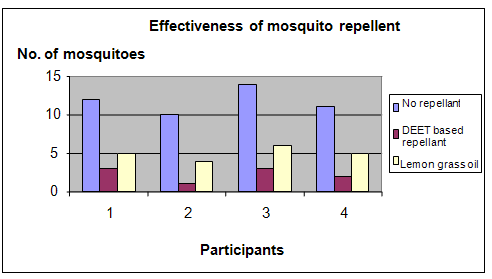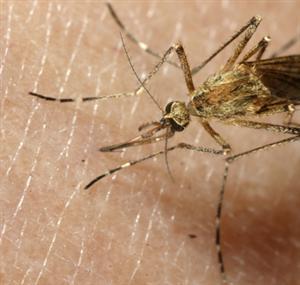| Complexity level: | 8 |
| Project cost ($): | 80 |
| Time required: | 1 day to prepare, 1 hour for science fair project |
| Material availability: | Easily found |
| Safety concerns: | Keep mosquito repellant away from children. Your will need 4 adults who are willing to expose their hands to the mosquitos. |
Hypothesis
Diethylmetatoluamide mosquito repellant spray is a more affective repellant compared to lemon grass oil.
Overview
Insect repellents
Insect repellants are substances that are normally applied to clothing or directly to the skin to keep insects away and prevent bites. They are commonly sold in the form of oils or sprays. Insect repellants help to prevent the outbreak of diseases like dengue fever and malaria, that are typically borne by insects. They work by masking the human scent by releasing other scents that repel insects avoid.
Synthetic insect repellants containing DEET have been found to last longer and also to be more effective than natural repellants. These synthetic repellants are able to retain their effectiveness for over 2 hours compared to natural repellants that last for less than 1 hour. However, overuse of synthetic repellants is believed to cause side effects like insomnia, impaired cognitive function and mood changes.
Natural substances can be used as insect repellants. They are normally less toxic and have fewer side effects. Examples of natural insect repellants are lemon grass and citronella oils.
Scientific Terms
Materials
The materials required for this science fair project:
- 1 empty aquarium with a top side cover
- 40 mosquitoes
- 1 can of mosquito repellant containing DEET
- 1 bottle of lemon grass oil
- 4 participants
- 1 stop watch
Procedure
1. For this science fair project, the independent variable is the type of mosquito repellant used – lemon grass oil or a DEET-based mosquito repellant. The dependent variable is the number of mosquitoes that come to rest on the participant’s hand. This is determined by observing and counting the mosquitoes on the participant’s hand. The constants (control variables) are the number of mosquitoes in the aquarium tank and the size of the aquarium tank.
2. Forty mosquitoes are caught or bred from a mosquito egg raft for this science fair project. The mosquitoes are then released into the aquarium and the cover is closed.
3. DEET-based mosquito repellant and lemon grass oil is first applied on a small area of the participant’s skin to check for any sensitiveness or allergic reactions. Four participants without any reactions to the insect repellants are selected.
4. The participants are first made to place their hand inside the aquarium for 30 seconds and the number of mosquitoes sitting on their hand is counted and recorded in the table given below.
5. The participants left hand is then coated with the DEET based mosquito repellant. They are then requested to place their left hand in the aquarium once more and the number of mosquitoes that come to rest on the skin of their hands within the next 30 seconds is counted. The result is recorded in the table given below.
6. The participant’s right hand is now coated with lemon grass oil. They are requested to place their right hand in the aquarium for 30 seconds. The number of mosquitoes that come to rest on their right hand is counted and recorded in the table given below.

Results
The results showed that the insect repellant containing DEET was more effective than lemon grass oil in repelling mosquitoes. .
|
Condition |
Number of mosquitoes sitting on participants’ hands |
|||
|
1 |
2 |
3 |
4 |
|
|
No repellant |
12 |
10 |
14 |
11 |
|
DEET based repellant |
3 |
1 |
3 |
2 |
|
Lemon grass oil |
5 |
4 |
6 |
5 |
The chart below represents the results of our science experiment

Conclusion
The hypothesis that Deet mosquito repellant is more effective than lemon grass oil, is proven to be true.
The instructions on the label of the insect repellant must be carefully read and followed before use. Caution must be taken especially when children or pregnant women are exposed to the spray. Only a small amount of the repellant should be used on children because they are at risk of reacting adversely.
Also consider
The science fair project can be repeated by comparing the effectiveness of other natural mosquito repellants like Neem oil.
Try to modify the science project to compare the effectiveness of eucalyptus oil in keeping flies away from food.
References
Insect repellant - http://en.wikipedia.org/wiki/Insect_repellent
DEET - http://en.wikipedia.org/wiki/DEET
Plant this to repel mosquitoes - http://www.hortmag.com/article/lemongrassmosquitoes

